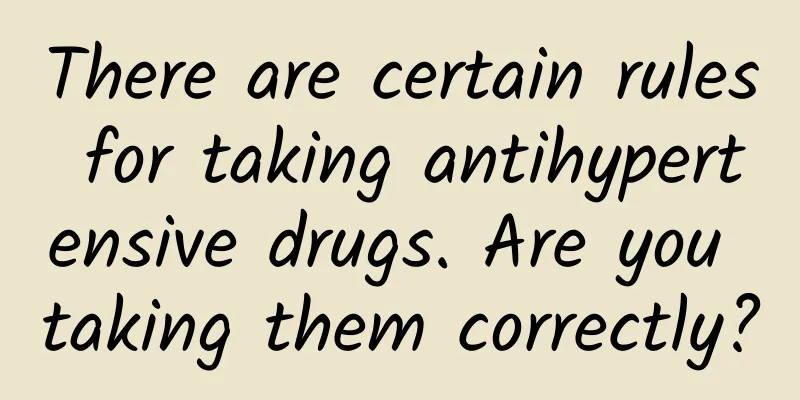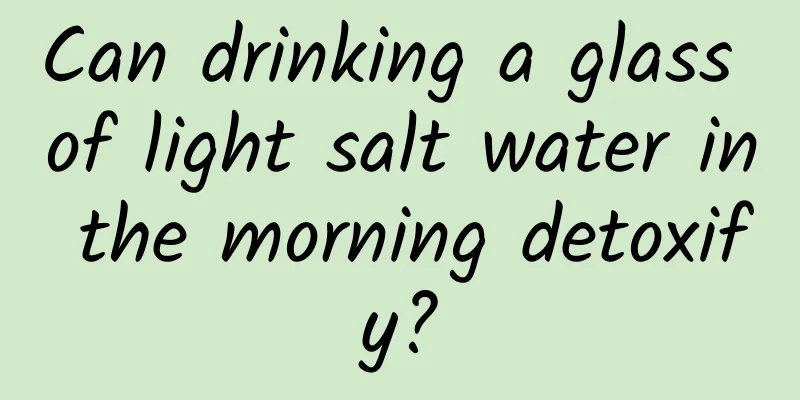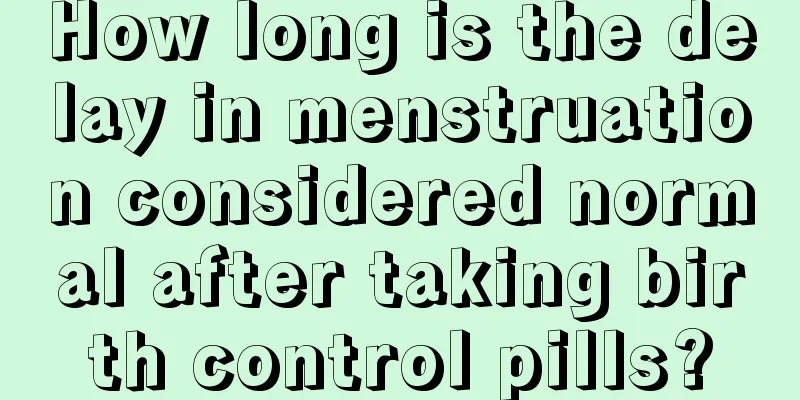There are certain rules for taking antihypertensive drugs. Are you taking them correctly?

|
Author: Tang Qin, Researcher of Chinese Medical Association Reviewer: Xu Xinye, deputy chief physician, Peking University Third Hospital Hypertension can lead to complications such as stroke, myocardial infarction, proteinuria, and renal insufficiency. Hypertensive patients often need to take antihypertensive drugs to control their blood pressure. In fact, there are some rules for taking antihypertensive drugs. How to take antihypertensive drugs reasonably? Let's learn more about it today. Figure 1 Copyright image, no permission to reprint 1. Do patients with hypertension have to take medicine? The basic principle of treating hypertension is to control blood pressure within an appropriate range to reduce the damage of high blood pressure to the human body. Improving lifestyle is the most basic means of controlling blood pressure. If blood pressure is still high after improving lifestyle, drug treatment can be considered. Generally speaking, there is no obvious difference between different types of antihypertensive drugs, and their efficacy mainly depends on the magnitude of their antihypertensive effect. Improving lifestyle requires attention to low-salt diet, appropriate increase in physical activity, and weight control, but it should be noted that only perseverance can produce a blood pressure-lowering effect. In addition, if blood pressure rises significantly, high-intensity exercise should be avoided, otherwise it may induce cardiovascular and cerebrovascular diseases. For some patients whose blood pressure values are already very high when hypertension is discovered, it is recommended that they immediately use medication to control blood pressure to reduce the risk of cardiovascular and cerebrovascular diseases, while also supplemented by lifestyle changes. After the latter takes effect, the dosage of medication can be gradually reduced under the guidance of a doctor. In addition, some diseases can also cause high blood pressure, such as severe insomnia, anxiety, snoring, etc. When these diseases are treated, blood pressure will naturally drop. A person's blood pressure is also affected by the climate. For example, blood pressure is generally lower in summer than in winter. Some patients can gradually reduce or even stop taking antihypertensive drugs in the summer under the guidance of a doctor. Figure 2 Copyright image, no permission to reprint 2. Precautions for patients with hypertension taking medication For most patients with hypertension, when is the best time to take medication is one of the more concerned issues. Generally speaking, antihypertensive drugs should be taken 1 to 2 hours before the peak of blood pressure. In most cases, the blood pressure of patients with hypertension is spoon-shaped, with the highest blood pressure in the early morning and lower blood pressure at night, so antihypertensive drugs are usually taken in the morning. In addition, a small number of patients have reverse spoon-shaped blood pressure, which is manifested as the highest blood pressure at night. At this time, they can adjust to taking antihypertensive drugs before going to bed, or taking antihypertensive drugs twice a day to ensure stable blood pressure at night. Some patients fear that it is difficult to swallow the medicine, so they break the medicine into pieces before taking it. This is inappropriate. Generally speaking, if the antihypertensive drug is a controlled tablet or a sustained-release tablet, it is not recommended to break it into pieces before taking it, because the controlled tablet or sustained-release tablet has a special structure that controls the release of the drug. Breaking, crushing, chewing, etc. will destroy the function of the drug, and the efficacy of the drug will naturally be affected. There are many types of antihypertensive drugs on the market, and their mechanisms of action are also different. Patients need to take them under the guidance of professional physicians to avoid aggravating adverse drug reactions and causing drug interactions. In addition, antihypertensive drugs should be taken at low doses, but many patients believe that increasing the dose or taking it more often can quickly lower blood pressure. In fact, this hasty approach may cause a sudden drop in blood pressure, which can easily cause myocardial infarction or ischemic stroke. Therefore, patients should not easily change the dose when taking antihypertensive drugs. Many patients with hypertension take medication based on their own feelings. In fact, the severity of the disease is not completely related to the subjective symptoms. For example, low blood pressure can also cause dizziness, and taking medication at this time may cause low blood pressure. Therefore, patients with hypertension must develop the habit of monitoring their blood pressure. However, regular monitoring does not mean monitoring every day. The recommended monitoring frequency is one day a week, and 2 to 3 time points on the same day. Figure 3 Copyright image, no permission to reprint 3. Do antihypertensive drugs have any adverse reactions? Theoretically speaking, most drugs have the potential to damage liver and kidney function, and antihypertensive drugs are no exception. Each antihypertensive drug has some common adverse reactions, such as slowed heart rate, edema, cough, etc., but most adverse reactions will disappear on their own after stopping the drug and will not cause excessive harm to the human body. Except for some patients with poor renal function, the probability of antihypertensive drugs damaging liver and kidney function is very low. If you are really worried, you can do a liver and kidney function test 1 to 2 weeks after taking the medicine to determine whether there is liver and kidney damage. In general, the safety of antihypertensive drugs commonly used in clinical practice is very good. As long as they are used reasonably under the guidance of a doctor, they generally do not have obvious adverse effects on liver and kidney function. It is recommended that patients with hypertension must first conduct 24-hour blood pressure monitoring, determine the type of hypertension, and then choose the appropriate time to take medication. It should be noted that the situation of each hypertensive patient is different, so it is best to monitor blood pressure daily under the guidance of a professional doctor and follow the principle of individualization for antihypertensive treatment. |
<<: Get out of the misunderstanding of asthma prevention and treatment
>>: What is phimosis? What are the symptoms of phimosis? How can it be treated?
Recommend
What is Sophora japonica tea? Benefits and functions of Sophora japonica tea
Sophora japonica tea is a kind of health tea comm...
Why is the milk yellow?
Many mothers will feed their babies breast milk a...
How to use arm ring for contraception
Reproduction is a need, and contraception is also...
What is the reason for heavy menstrual flow and abdominal pain?
Menstruation is actually regular bleeding caused ...
What kind of fungi are used to make rice wine? How many days should you cover the rice wine in summer?
Rice wine is a sweet rice wine made by mixing ste...
Can I have a baby after having a leep surgery?
Women can have children after having a leep opera...
Treatment of cervical polyps
I believe everyone is familiar with the disease o...
How long after biochemical pregnancy can you have a child
A biochemical pregnancy occurs when the fertilize...
Liver fire during menopause
People start to enter menopause when they are in ...
Is 9 weeks of pregnancy the peak period for morning sickness?
Women experience great pain during the 10 months ...
Blisters on the cervix
Today's women not only have to face the press...
What medicine is most effective for breast enlargement?
Every woman will experience this problem after gi...
If you don't vomit during pregnancy, you are stupid
Vomiting is the most common reaction during pregn...
How many days after the menstrual period ends can I have sex?
Women in their childbearing years ovulate once a ...
What should I do if I have frequent and painful urination during menstruation?
Many people think that frequent urination and urg...









